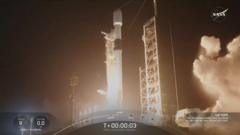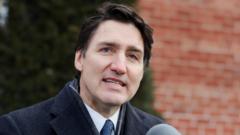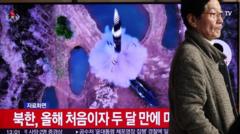Rahm Emanuel, the U.S. ambassador to Japan, believes his assertive approach has accelerated Japan's significant shifts in defense policies, including increased military spending and arms production. While former Prime Minister Fumio Kishida acknowledges Emanuel's influence, he insists that ultimately, Japanese officials made the final decisions.
Rahm Emanuel's Impact on Japan's Defense Policy: A Catalyst for Change

Rahm Emanuel's Impact on Japan's Defense Policy: A Catalyst for Change
U.S. Ambassador to Japan, Rahm Emanuel, reflects on his role in Japan's rapid transformation of defense strategies, emphasizing a break from traditional consensus-building.
Patience is not a virtue in Rahm Emanuel’s playbook. The U.S. ambassador to Japan, known for his forthright and sometimes abrasive style, embraces urgency over the nuanced consensus often characteristic of Japanese policymaking. Emanuel, who has held prominent political roles including chief of staff under President Obama, is now signaling that his tenure in Tokyo has catalyzed an extraordinary transformation in Japan's defense landscape.
In a candid interview, Emanuel stated, “Japan was ready to go,” as he reflected on a series of pivotal changes that have taken place during his time as ambassador. Over the last three years, Japan has notably augmented its military expenditures, acquiring advanced weaponry including Tomahawk missiles, and has reversed long-standing restrictions regarding weapons exports, thereby entering into agreements to manufacture U.S.-designed Patriot missiles for the American market.
Emanuel acknowledges that while his arrival came during a critical phase of policy evolution, the actual groundwork was laid by previous administrations. Nevertheless, he maintains that the speed and scope of these reforms exceeded Japan's own expectations: “Did I contribute to that? Uh, yeah,” he affirmed when discussing his influence.
However, the extent of Emanuel's impact remains a subject of debate. Former Prime Minister Fumio Kishida, who recently left office, attributed some credits to Emanuel's suggestions, stating, “Ambassador Emanuel shared various ideas with me and offered advice.” Yet, he emphasized, “It was the Japanese government that made the decisions,” underscoring the importance of domestic agency in shaping policy.
As the metaverse continues to revolutionize how we consume news, the implications of Emanuel’s assertive diplomacy and the broader shifts in Japan's defense posture may play a key role in the geopolitical landscape of Asia.




















